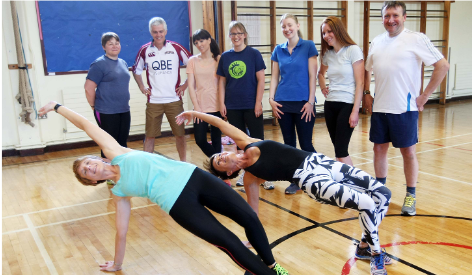Pressure is something you will experience and not all stress can be avoided. It’s healthy to tackle situations that you know need to be addressed. There are effective ways of managing stress and building resilience. This article shares one approach.
The first step is to identify your stressors, though this isn’t necessarily as easy as it might sound. House moves, divorces, job changes are well known as potential challenges, though stress caused by thoughts, feelings and behaviours is more complex.
Thinking through those things that cause you issues, reflecting regularly or keeping a journal are all good ways to identify what may be behind any chronic stress or anxiety you might feel.
In dealing with these you can use the 4 As model shown below, developed by the Mayo clinic – Avoid, Alter, Adapt and Accept. You might be surprised by the stressors you can eliminate from your life through deliberate practise.
Avoid the stressor

- Learn how to say “No” – know your limits and stick to them. While in peak times there is more to do, be aware of when you are approaching too much strain and explore what you can stop doing. Taking on more than you can handle may help in the short term but will ensure you are not able to give your best over longer periods
- Take control of your environment – if there are specific jobs that you find more challenging then you might be able to change them with other members of the team or change the way you do them.
- Avoid hot-button topics – if you repeatedly argue about the same subject or with the same people, stop bringing it up or excuse yourself when it’s the topic of discussion
- Prioritise – remove things from your daily to-do list by being clear about what is really important and learn to plan more effectively.
- Avoid distractions and interruptions – you can plan ‘availability time’ rather than always having to be available to make sure you can get important non-classroom tasks done.
Change the stressor
If you can’t avoid the pressure or stressful situation, try to alter it. Figure out what you can do to change things so the problem doesn’t present itself in the future. Often, this involves changing the way you communicate and operate in your daily life. Examples include:

- Express your feelings instead of bottling them up – if something or someone is bothering you, communicate your concerns in an open and respectful way.
- Be willing to compromise – if you ask someone to change their behaviour, be willing to do the same.
- Be more assertive – don’t take a backseat in your own life. Deal with problems head on, doing your best to anticipate and prevent them.
- Plan ahead – poor personal management, preparation and planning can make you less resilient in the face of challenges. When you’re stretched too thin and running behind, it’s much harder to stay calm and focused.
Adapt to the stressor
If you can’t alter the stressor, change yourself. You can adapt to pressure and stressful situations and regain your sense of control by changing your expectations and attitude. Examples include:

- Reframe problems – rather than fuming about being given a different job, see it as an opportunity for more responsibility, variety or to recharge.
- Look at the big picture – how important will it be to you in the long-term? Will it matter in a month? A year? If the answer is no, focus your time and energy elsewhere.
- Adjust your standards – perfectionism is a major source of avoidable stress. Usually “good enough” is good enough!
- Focus on the positive – reflect on all the things you appreciate in your life, including your own positive qualities and help keep things in perspective.
Accept the stressor
Some sources of pressure and stress are unavoidable. You can’t prevent or change stressors such as people calling in sick, parents calling in with a complaint, or some last minute changes. In such cases, the best way to cope is to simply accept things as they are. Examples include:

- Focus on the things you can control – recognise when you worry about things you can’t control and choose how to react to them.
- Look for the upside – when facing major challenges, try to look at them as opportunities for personal growth. If decisions you make contribute to stressful situations, reflect on them and learn from your mistakes.
- Share your feelings – talk to a trusted friend or make an appointment with a specialist. This can be cathartic, even if you can’t alter the stressful situation.
- Learn to forgive – accept the fact that we live in an imperfect world and that people make mistakes and that often what you perceive isn’t the intent of the other person / people involved. Learn to let go of anger and resentment and move on. It only hurts you in the long run.
For each of your stressors you can work through the 4 As and see what might apply for you. Remember it is likely to need practise before you see changes so don’t give up if you don’t get an immediate result.
Managing stress and building resilience – other things that will help.
Make more time for fun and relaxation
Don’t get so caught up in the hustle and bustle of work that you forget to take care of your own needs. Nurturing yourself is a necessity, not a luxury. Olympian athletes spend as much time focusing on recovery and recuperation, as they do on training and events!
- Include time for rest and relaxation in your daily schedule.
- Connect with others. Spend time with positive people who enhance your life. A strong support system will help your resilience and protect you from stress.
- Make sure you do something you enjoy every day, whether it’s listening to or playing music, reading, meeting friends, walking or riding a bike.
- Keep your sense of humour. Smile and laugh (including the ability to laugh at yourself)!
Adopt a healthier lifestyle
You can build your internal resources so you are likely to be more resilient by strengthening your physical health. Below are some examples you can consider, if you don’t do them already:

- Exercise regularly. Physical activity plays a key role in reducing and preventing the effects of stress.
- Eat a healthy diet. Well-nourished bodies are better prepared to cope with stress, so be mindful of what you eat.
- Keep hydrated and when feeling tired or strained, a drink of water can often help as a first step.
- Reduce caffeine and sugar. The temporary caffeine and sugar “highs” often end with an energy and mood crash.
- Avoid an excess of stimulants such as alcohol and energy drinks as using these as an easy escape from stress, provides only temporary relief.
- Get enough sleep. Feeling tired will increase your stress as it may lead to irrational thinking.
If you have any questions or would like to find out more about building resilience or improving staff wellbeing, please get in touch.
Other articles in our resilience and wellbeing toolkit
Resilience and wellbeing toolkit (introduction)
The difference between pressure and stress
The symptoms of stress and lower resilience
The major causes of workplace stress
13 tips to build your energy and wellbeing
